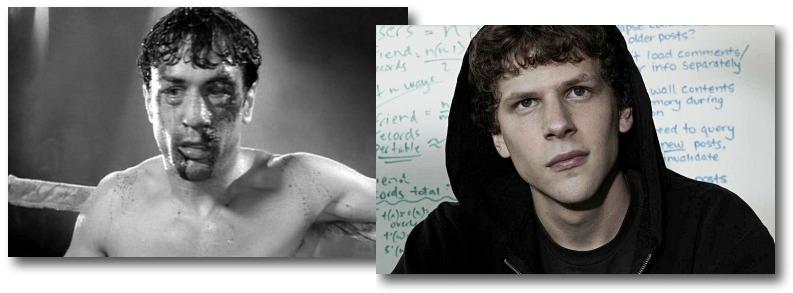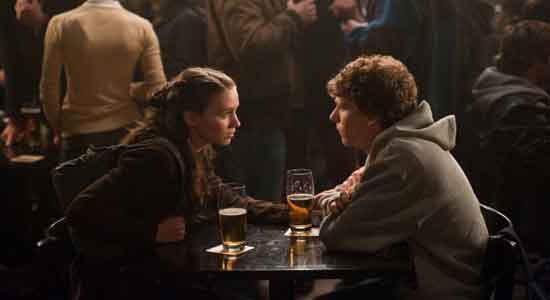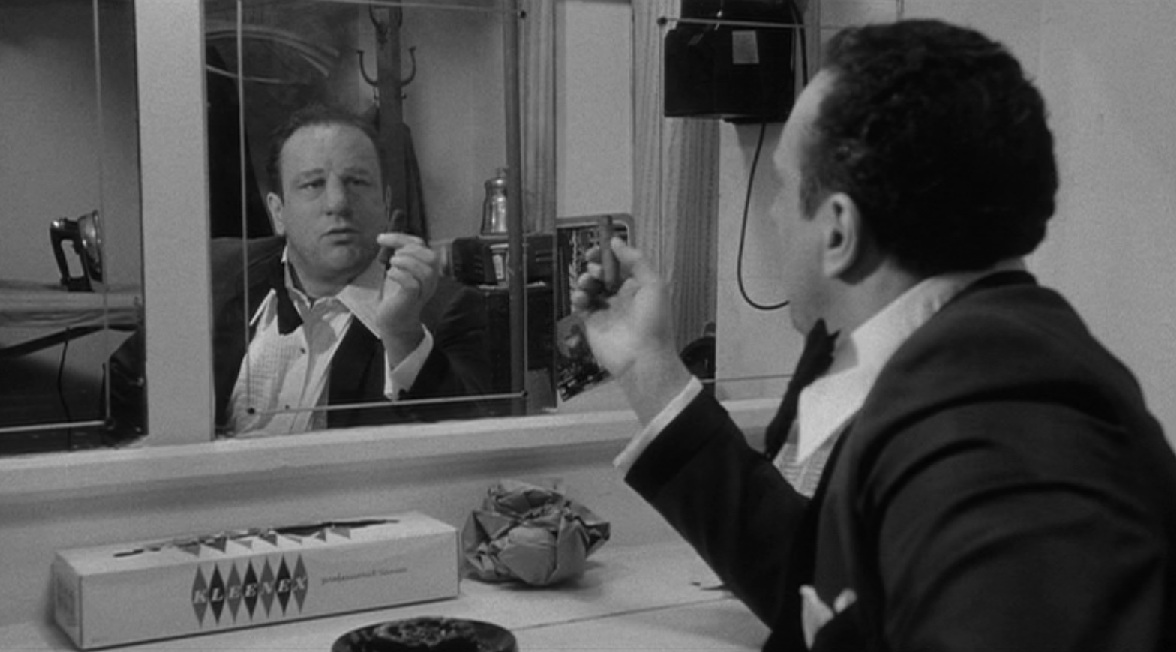Distant Relatives: Raging Bull and The Social Network
 Thursday, February 17, 2011 at 11:30AM
Thursday, February 17, 2011 at 11:30AM Robert here, with my series Distant Relatives, where we look at two films, (one classic, one modern) related through theme and ask what their similarities/differences can tell us about the evolution of cinema.

At what price greatness?
You may think, at first glance, that the 2010 film that has the most in common with 1980’s masterpiece Raging Bull is The Fighter. Yes they’re both about boxing and boxers, but that’s practically where the similarities end. As far as stories about misanthropes striving to do something great while sabotaging their own relationships, few come closer to Jake LaMotta than The Social Network’s Mark Zuckerberg. One immediate similarity is that they’re both real people, but for our sake here we will forget that and approach them simply as characters within their respective movies.
Raging Bull is the story of boxer Jake LaMotta (Robert DeNiro), his relationship with brother Joey (Joe Pesci) and wife Vicki (Cathy Moriarty) over whom his protectiveness manifests itself in more and more aggressive ways as he rises and falls from the grace of the boxing world.
The Social Network is the story of Harvard student Mark Zuckerberg (Jesse Eisenberg) the creation of Facebook, and how the process dissolved his relationship with his best friend and was fueled, in part, by his contempt for rowers Tyler and Cameron Winklefoss (but really everyone).
Did you poke my wife?

We start off with two socially awkward characters though their awkwardness manifests itself in different ways. LaMotta seems unable to do anything without the assistance of his brother, not score matches, not find the favor of women. Zuckerberg meanwhile is very capable, but his non-existant social graces don’t allow him any awareness of anyone in the room but himself. Added to this awkwardness is a good helping of narcissism, though LaMotta might wait until you know him better before aggressively insisting on his own greatness. Zuckerberg would probably tell you up front. And topping all of this is a strong dose of jealousy.
In an odd way, perhaps it's that jealousy that helps buoy both to the top. LaMotta's jealousy manifests itself in the constant suspicion that his wife is sleeping around. The thought of his opponents with his wife certainly doesn’t hurt him (though it does them) in the boxing ring. Would the world championship LaMotta wins be possible without this factor motivating him to throw punches? In the case of Zuckerberg, we can be pretty sure that his disdain for the Winklevii and rowers in general isn’t the only reason he starts Facebook, but notice how he doesn’t commit to (with the intention of stealing?) their project until they reveal that they row crew. In fact the entire quest against crew begins in the film’s opening scene where a casual remark by his soon-to-be ex-girlfriend Erica about liking guys who row crew should be easily dismissed, but Zuckerberg carries it well into the argument, eventually sarcastically spewing “and I’m sorry I don’t own a rowboat.” How much does this anti-crew bias, perhaps a feeling of inadequacy compared to his girlfriends preference of world class Olympic athletes, fuel Zuckerberg? And how much is he fueled by jealousy toward his best friend Eduardo’s impending acceptance into one of Harvard’s Final Clubs?
Eventually it destroys his relationships, another thing he shares with Jake LaMotta. LaMotta’s raging jealousy destroys his ties with his brother and his wife. The self-centeredness that pushes both of these men toward greatness also burdens them with a set of blinders, unable to care for their relationships with the people they care for.
Cracking some eggs

There is another tie here. Boxing and cyber enterepeneurship may be vastly different professions but they’re professions that neither LaMotta nor Zuckerberg can separate from their personal lives. LaMotta punches people for a living. It’s what he knows. And so at home, he can only express himself by punching people. Zuckerberg is a little more complicated but the connection is still present. In creating Facebook, Zuckerberg has invented a reality where the intimacy of friendship is a secondary thought and “friends” are treated more like an audience for one’s self-promotion. So it goes in Zuckerberg’s life. He’s less interested in mature relationships with actual friends than being surrounded by individuals who are in perpetual awe of his greatness.
Much like our discussion of Charles Kane and Daniel Plainview earier, the differences between these two men are found in the consequences or perceived consequences of their actions. LaMotta gets it worse, losing his title, becoming a fat joke, jailtime. Yet at the very end, we can’t know how triumphant he is in his own mind. When he says “I’m the boss, I’m the boss, I’m the boss,” is he just trying to convince himself? When Zuckerberg declares “I'm the CEO... bitch” he may also be trying to convince himself of his own greatness, but he pays a far lesser price for his self-superiority. Lawsuits sure, a drop in the bucket (he doesn’t care about money) and the loss of his friends like LaMotta, but no jailtime, no scandalous encoutners with underage girls like LaMotta (that’s for another member of the Facebook team.)
As an audience we love tales of the rise to and fall from glory, a little abnormal psychology to remind us that greatness requires sacrifices too great (and of too many values) not to appreciate the mundanity of our lives. But why sets the modern film apart is how many people may in fact noting trading places with Zuckerberg, the world's youngest billionaire. Truth is, The Social Network is not a tale of rise and fall but just a tale of rise (with consequences of course). As an audience perhaps we no longer expect the fall or demand the fall or realize since the true story of Mr. Zuckerberg is still ongoing there may very well not be one.
In both cases, LaMotta and Zuckerberg, we can look at the success and ask according to our own standards "was it worth it?" In the twenty years between these films it may not have become easy to answer "yes" but it's gotten easier.



Reader Comments (11)
Great piece! I definitely think Zuckerberg as portrayed by Eisenberg is one of the most fascinating protagonists we've seen in film in quite some time. His mannerisms and behaviour certainly reflect the current generation of internet users, but he also embodies timeless traits like jealousy and ambition (as you mentioned above). I certainly wouln't be surprised if in twenty of thirty years we look back on The Social Network as one of the all time great movies, as we do Raging Bull now
Tom -- i wouldn't either which is not something i think we can say about The King's Speech (sigh)
Robert -- i never would have thought to pair these which is why i enjoy these so much.
"mannerisms and behaviour certainly reflect the current generation of internet users"
Really? I am quite sure you must be the 30 yr old guy who thinks he's still 20 passing such facile generalizations.
As to the article's thesis, its assumption of Zuckerberg the character as Zuckerberg the man, is a glaring flaw. Talk about the rise and rise or imminent fall of the movie's character...not the real life man. Moreover, as a coder myself, let me tell you one simple fact that's lost in all this relationship melodrama, and that the real-life Zuck also stresses....the pure, simple and innate motivation to "just"" create, to build something of one's own, to sit and code, and fail, and debug, and fail again, and debug, and on and on....That's just not there in the film. You don't and can't build something useful and creative to stick it to a girl( Gatsby didn't build anything, he just made underhand money). That's just bullshit.
And the movie is going to be infamous for one of its many fictions- Rooney Mara's character and the blindingly obvious, authorial-inserted "tragic" end-scene with Zuck the character dawdling over the lost girl. How very subtle!
Actually Rohit, I'm 19, so I do feel I'm at least somewhat qualified to talk about the current generation, given that I'm part of it. Then again, even if I was 30, or even 60, it wouldn’t necessarily mean I was unable to comment on the habits of internet users. It seems to me like you're the one making facile generalisations.
What I meant by my comment was, think about the way Zuckerberg talks and acts. Arrogant, aloof, abraisive, dry witted, snarky, sarcastic, coldly dispassionate and occasionally cruel. You can't tell me that that doesn't remind you of internet commenter’s and bloggers? In fact I even think I detected a smite of some of those things in your own comment. How very Zuckerberg of you!
Obviously, the film is fictitious, and Zuckerberg as portrayed by Eisenberg is probably very different from the Zuckberg the real life human being. But I think it's important to realize that when people are writing about The Social Network, they're not talking about the real person...they're talking about a character. I'm not sure writers should have to make the differentiation every time, it seems rather redundant.
You might very well be right that the movie fails to capture the true motivation behind Facebook's creation, or the inherent motivation some people find within the pure joy of creating something. However, again, I think it's important to remember that this is a fictitious film...characters are motivated by whatever the writer, director and actors decide upon. Personally, I DON'T think it's totally unrealistic for someone to create something just to impress/stick it to a girl (or anyone for that matter). I also think that Zuckerberg's (again, I'm referring to the FICTITIOUS CHARACTER) motivations were more complicated than JUST sticking it to Erica Albright, though it was definitely a part of it.
You are right, about my response. Some of the irritation I feel is actually a compliment to the movie and its characterization of Zuck's anti-establishment arc(That''s another lazy characterization: The Harvard Clubs..archaic and stupid, really. For most of our generation, subversion of the system is innate, a daily activity itself, its is NOT born out of jealousy or the need to be in a clique...)...When good films are rare, and happy fluff like The King's Speech roll on, even a slightly "timely" movie is anointed as the "Citizen Kane of our time", The Raging Bull of future generations etc. In a hyper-textual world, when I KNOW with absolute certainty, that a particular character in a fiction I am watching is forcefully inserted, I am bound to be at guard against any generalization. Still, even if the truth doesn't enter into the picture, one must consider the possibility of at least the film understanding its characters. But my own personal response was that it failed to do so.
As to the experience of watching the movie without my own personal baggage(isn't that hard to do in this meta-size hyper-world), I enjoyed it, especially the direction and the music.( The Rowing Scene gave me goosebumps). However, I also believe that standards have fallen, and when a slightly nourishing film comes by, we are prone to add unseemly and undeserved tags. (All this might just be a roundabout way of confessing my backlash against "universal acclaim")
And Sorkin, whose entire output I watched before seeing this film, from Sports Night to Studio 60 to The West Wing, is quite talented but with a natural, slightly old-fashioned idealism(Look at each of the shows I mentioned and their inherent idealizations). And, this is the MAJOR reason I was skeptical to the film's outlook/fake elements/characterization- that the writer, a good one, is dismissive of his central man and His creation, that he is passing judgment through his art...that he Doesn't understand Zuck, forget us, even!
It would have worked better for me if the satire was amped up and the authorial presence through the artificial tragic elements downplayed.
Fair enough. I suppose it may seem a bit hyperbolic to declare that a film will be considered one of the all time greats so soon after its release. Only time can settle that debate.
I do think that’s a good point you make about Sorkin’s ideals. While personally I don’t think his dismissive attitude towards Facebook made the film any less relevant or good, it undoubtedly had an effect in crafting what exactly the film was. I certainly understand why this could make you skeptical, especially after reading some of his comments about Facebook in interviews.
Rohit -- i do agree with you that when any nourishing films come around these days people f-r-e-a-k out. I deeply love The Social Network but even as a huge fan of it I find many of the reviews ridiculous in their assertions. FACEBOOK may define a generation but the movie doesn't. Though even that Facebook defining any generation is reductive since people of seemingly all ages are obsessed with it and whenever 20somethings or teens get all "this is ours! old people don't get it" about the things they're in to I always bristle a bit since in my experience 30 and 40somethings are often quite obsessed with tumblr, twitter, facebook, whatever is the hot new thing, etcetera. I really think all of these things are more about people's personalities -- what feels natural "i wish i'd always had this" or exciting to them -- than about their ages. I know a guy in his fairly young 30s who is TOTALLY not into the internet other than YouTube and I know people in their 40s who live on it. My point is i don't think the internet is FOR young people anymore than music or art or movies are, you know? They just might be a little more conspicuous about their consumption of all of the above. But the movie certainly doesn't define 20somethings. Iit's too specifically a study of "Mark Zuckerberg" and I don't really think it's trying to be about THE WAY WE LIVE NOW. I mean there's very little of people living online in the movie. It's much more about masculine ambition and disconnect (the aspergers feeling might be the closest it comes to being a generational portrait) and betrayals and very very human extremely timeless stuff than about how we all live now.
I give you Shakespeare. Again.
You are right about the masculine fabric of the film, some scenes are adrenaline shots.
And, all these qualities means the film actually does fit harmoniously in Fincher's and Sorkin's oeuvre.
I might be sticking my neck out, but I think our generation is quite possibly prone to being jaded..I wish they made a movie like "The Moviegoer" for these media-saturated times...
The Moviegoer? Interesting choice, except for the fact that THERE IS NO AMERICAN BERGMAN. Plus, Scott Pilgrim, which deals with very much the SAME THINGS, has already been adapted. (I don't think Pilgrim is a masterwork for a few reasons: sexist end for a fight scene (the comic has Scott do that...but to HIS ex-girlfriend), character beats excised to the point that everyone other than Scott is 2-D, and, even in the comic, Scott is maybe 2.5 at best, to use a video game term, and, consequently, a pace that absoultely refuses to calm down. However, the pace is a double edged sword, the fight scenes are beautiful and crisp in their own hyper way and the movie is beautiful. At this point, I think Wright's batting .850.)
Wow!, I'm impressed with the image above in the right side because look at him I think that he needed a little bit of Viagra UK in order to face the fight and win.
nice information. It feels really great to read such kind of wonderful piece of writing